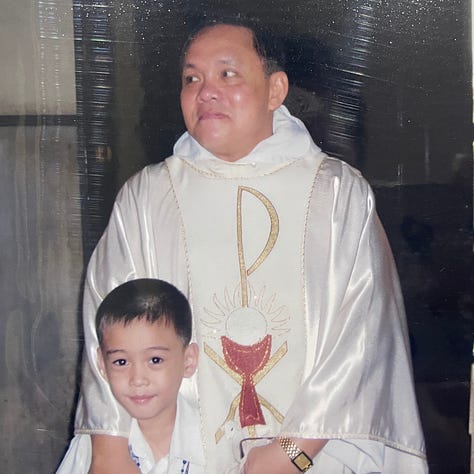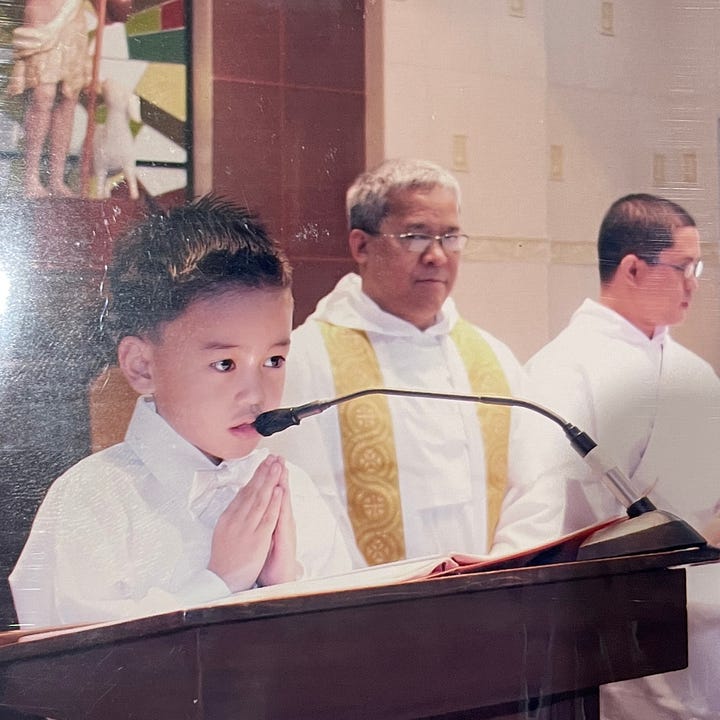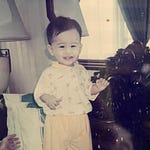You might be wondering: how did I come to know God?
Well, here’s the story.
Like many Filipinos, I was born and raised Catholic. But unlike families who inherit it purely by tradition, mine believed because they had experienced Him. If you’ve read or listened to the Prologue, you’d know—after nine years of unexplained infertility, my parents had me. Then my siblings. To them, we weren’t just blessings—we were miracles. Proof that God answers prayers.
So faith wasn’t just part of our household. It defined it.
So, how Catholic are we?
My dad was a Eucharistic minister and a member of the Knights of Columbus—a fraternal organization that helps Catholic men support the Church, protect their families financially, and serve the poor through acts of charity. Every Sunday, he’d assist in administering Holy Communion. My mom, on the other hand, was a lector at Mass. We prayed the rosary regularly—a tradition passed down to us by a nun who used to live in our condo. It’s something we still do to this day. Our house felt like a chapel, with statues of Mama Mary, framed images of Jesus, and an altar in my parents’ bedroom.
We were devout. And I wasn’t forced into it, either. I actually loved it.






I liked praying. I liked the quiet. I loved rituals and reverence. As a child, I was captivated by our Bible storybook. I’d flip through the pages, fascinated by the miracles, the heroes, the parables. To me, God was real.
But somewhere along the way, I lost the simplicity of it.
When Faith Started to Hurt
Looking back, I think I lost my childlike faith early, much earlier than most.
Because I already knew, deep down, that I was different.
I wasn’t like the other boys. I was soft. Sensitive. Expressive. Bakla.
And because of that, I began to believe that love—especially God’s love—was something I had to earn.
So I performed.
I followed the rules. I prayed the prayers. I tried to be “good.” Not just to please my parents, but because I didn’t want to add to their problems. I already felt like one. So I tried harder. I behaved. I obeyed. I hoped maybe, somehow, I could earn God’s approval.
I didn’t see Him as a Father. I saw Him as a genie—and a punisher.
Someone I could bargain with.
Someone who’d reward me if I got it right.
“Please, Lord,” I’d pray, over and over again.
“Make me straight. Take this away.”
But nothing happened.
So I kept trying—harder this time.
I studied theology—I could name all the books of the Bible, recite the Ten Commandments, and explain every part of the Mass. I was praised often because I had mastered the religious answers. I got high scores and wrote reflections that teachers loved, but if I’m being honest, I wasn’t really reflecting. I was performing. Theology became my favorite subject—not because it transformed me, but because it felt like a way to win the world’s affirmation—and maybe, even God’s.


Moreover, I felt spiritually superior to other Catholics and Christians who were devout but scored lower in theology and weren’t chosen to read scripture in masses. Especially since I was often chosen to be the lector/reader in masses and special events. one of the “favorites.” Like maybe if I knew more, I could be more. Like maybe I could drown out the part of me I hated by hiding behind knowledge and perfection.
But I was still aching.
The Ache of Being a “Baklang” Christian
The older I got, the louder the voices became:
“You’re funny but being gay is wrong.”
“That’s not how God made you.”
“You’re going to hell.”
And I started to believe it. Not just as information, but as identity.
When I prayed, I didn’t feel embraced. I felt exposed. Ashamed.
Like God was looking at me and thinking, “You’re not what I wanted.”
So I prayed harder. I begged: “Please, God. Fix me.”
Every time my parents told me to act like a boy, I tried.
Every time they reminded me they didn’t have a gay son, I prayed again.
And when I got bullied—when classmates laughed at how I talked, walked, or moved—I felt like it was my fault. Like maybe God was punishing me. Maybe I deserved it.
So I tried to “fix” myself.
As I shared in Chapter 1, I turned to things like the Law of Attraction, visualizing a more “manly” version of myself. I tried living a double life: gay at school, boy at home. And I dated girls.
Some I genuinely liked. Others I pursued because I thought, “If I just had a girlfriend, maybe I’d finally be normal. Maybe I’d be cured. Maybe I’d make God proud.”
So I continued performing. I followed the rules not out of love, but out of fear.
Underneath it all, I believed this: If I’m not lovable as I am… maybe I can earn love by becoming someone else.
But over time, suppressing who I was didn’t make me more holy. It just made me more tired.











Share this post